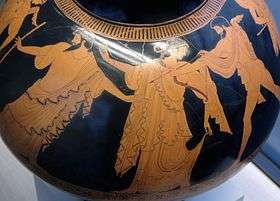Marpessa of Aetolia
In Greek mythology, Marpessa /ˌmɑːrˈpɛsə/ (Ancient Greek: Μάρπησσα, romanized: Márpēssa, "the robbed one") was an Aetolian princess, and a granddaughter of Ares.
Family
Marpessa was the daughter of Evenus[1][2][3] (son of Ares and Demonice) and Alcippe (daughter of Oenomaus and sister of Hippodamia).[4] She attracted the attention of the hero, Idas as well as the god Apollo. She eventually married Idas, by whom she begot Cleopatra, the future wife of the hero Meleager.[5]
Mythology

Marpessa was a beautiful lady, described as being "fair-ankled".[6][7] Idas, son of Aphareus, came from Messenia to asked for the hand of Marpessa. But Evenus refused his request because he wanted her daughter to remain a virgin. Idas went to his father Poseidon and begged for the use of a winged chariot.[8] After Poseidon consented to his use of the chariot, Idas raped Marpessa and carried her away from a band of dancers and to Pleuron in Aetolia.[9] Her father, after chasing the couple for a long time, realized that he could not catch up to them. In his madness, he killed his horses and then drowned himself in a nearby river Lycormas and became immortal. The river was named later after him.[10]
In other version, Apollo also wanted Marpessa and pursued Idas as he carried away Marpessa. As the two fought for the girl's hand, Zeus intervened and asked Marpessa to choose between the mortal and the god. Marpessa chose Idas, reasoning to Apollo that had she chosen the god, she would have eventually grown old and lost his affections.[11][12]
In Homer's version, Marpessa was already married to Idas when Apollo carried her away from her husband. Idas, however, confronted Apollo. [13]
"Idas that was mightiest of men that were then upon the face of earth;
who also took his bow to face the king Phoebus Apollo
for the sake of the fair-ankled maid [i.e. Marpessa]."[14]
When Idas was slain by the hands of Polydeuces, one of the Dioscuri, Marpessa killed herself.[15]
Modern use of the name
- It is thought that the modern and rare Italian female personal name Marfisa and the variants Marfisia and Marfisio (male version) descend from Marpessa. This is probably supported by the history of the evolution of the name itself.
- Marpessa, as a name, was used to describe a 206,000 ton Shell Oil company supertanker (VLCC). In December 1969, it became the world's largest oil tanker to sink up to that date. Marpessa had been on its maiden voyage from Europort, Rotterdam, when an explosion ripped through the hull and it foundered 50 miles off the west coast of Africa
References
- Propertius, Elegies 1.2
- Pseudo-Apollodorus, Bibliotheca 1.8.2
- Pausanias, Description of Greece 4.2.7 & 5.18.2
- Plutarch. Parallela minora, 40
- Homer, Iliad 9.557
- Homer, Iliad
- Pausanias, Description of Ancient Greece
- Jeanie Lang. A Book of Myths, p. 90-99.
- Baccchylides. Dithyrambs, 6.1
- Plutarch, Names of Rivers and Mountains
- Apollodorus, Library 1.7.10
- Jeanie Lang. A Book of Myths, p. 90-99.
- Homer. Iliad, Book 9.557
- Homer. Iliad, Book 9.557

- Pausanias. Description of Greece, 4.2.7 & 5.18.2
Sources
- Baccchylides. Dithyrambs
- Homer, Iliad.
- Propertius, Elegies.
- Plutarch, Parallel Lives.
- Pseudo-Apollodorus, Library.
- Pseudo-Plutarch, De fluviis.
